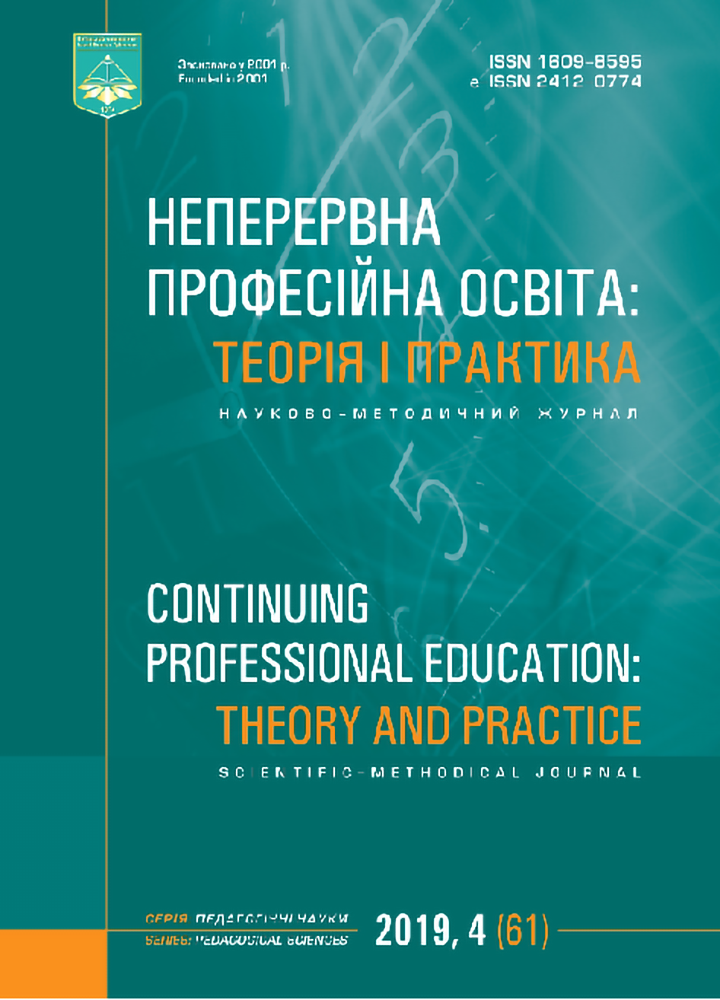HISTORICAL EXPERIENCE OF HIGHER EDUCATION QUALITY MONITORING ON THE CASE OF SOCIOLOGICAL SURVEY «TEACHER’S EYE STUDENTS»
DOI:
https://doi.org/10.28925/1609-8595.2019.4.2631Keywords:
quality of education, questionnaires, students, surveys, teachersAbstract
The article deals with the issues of the historical formation of the process of monitoring the conduct of sociological surveys regarding the assessment of personal and professional qualities of teachers by students in the context of pedagogical, sociological, managerial dimensions and cross-cultural empirical studies. To improve the competitiveness of higher education institutions in the educational market, both the university administration and the teachers have developed a methodological complex for evaluating the quality of the educational process. The attention is focused on the implementation of monitoring results with the involvement of the results of the study «Teacher through the eyes of students» on the problem of characteristic features of the study of countries in certain historical eras. The process of transforming survey forms to clarify the essence of the ideal teacher is demonstrated.
Teaching quality is a complex characteristic that reflects the range and level of educational services provided by a teacher in accordance with the interests of the socio-educational paradigm, the student, the administration of the university and allow comparative assessment of teachers. The experience of other countries in this field will allow domestic methodologists-experts to build the most optimal format of sociological monitoring of consumer satisfaction with the quality of higher education.
From the organizational point of view, the findings of the study will be useful for educators and the administrative corps, which will encourage the teacher to improve himself. The systematic and systematic implementation of the international surveys in conducting sociological monitoring, the students’ taking of the organization of the educational process will allow to trace the dynamics of positive or negative tendencies, to minimize the errors of the study, to offer real measures to optimize certain aspects of educational activity.
References
Andrushchak, H. (2007). Systema otsenivania prepodavatelei studentamy: upravlencheskye innovatsyi v rossiiskykh VUZakh [Student Assessment System for Students: Management Innovations in Russian Universities]. Voprosy ekonomyky, 6, 106–115 (rus).
Velychko, O., &Viktorov, V. (2003). Samootsiniuvannia u VNZ yak diieva skladova menedzhmentu yakosti osvity [Self-esteemin universitiesasan effective component of quality management education]. Visnyk UADU, 2, 379–388 (ukr).
Zhabenko, O. (2019). Rol studentiv v otsiniuvanni profesionalizmu naukovo-pedahohichnykh pratsivnykiv universytetiv [The role of students in evaluating the professionalism of university teaching staff]. Osobystist studenta ta sotsiokulturne seredovyshche universytetu v suspilnomu konteksti. Kyiv, Ukraine: IVONAPN, 25–29 (ukr).
Zapesotskyi, A. S., &Sankin, L. A., & Vyktorenkova S. V. (2007). Prepodavatel hlazamy studenta: ob yzuchenyy mnenyi studentov o kachestve pedahohycheskoi deiatelnosty prepodavatelia [The teacher through the eyes of a student: on the study of students’ opinions on the quality of the teacher’s pedagogical activity]. Vysshee obrazovanye segodnia, 9, 28–32 (rus).
Zvarych, I. (2010). Funktsii otsiniuvannia yakosti pedahohichnoi diialnosti vykladachiv u vyshchykh navchalnykh zakladakh USA [Teacher Quality Assessment Functions of Teachers in US Institutions of Higher Education]. Molod i rynok, 10 (69), 72–78 (ukr).
Kopylov, V. A., & Kolotova, L. V., & Lobanova, L. A. (2016). Prepodavatel hlazamy studenta (sravnitelnyian aliz mnenyi studentov o kachestve pedahohycheskoi deiatelnosty prepodavatelia) [The teacher through the eyes of the student (comparative analysis of students’ opinions about the quality of teacher’s pedagogical activity)]. Humanitarnyi chasopys, 1, 103–112 (rus).
Shvets, D. Ie., & Turba, O. O. (2011). Sotsiolohichne opytuvannia yak mekhaniz mmonitorynhu zadovolenosti studentiv stanom navchalno-vykhovnoho protsesu [Sociological survey as a mechanism for monitoring student satisfaction with the state of the educational process]. Humanitarnyi visnyk ZDIA, 47, 237–243 (ukr).
Adams, J. V. (1997). Student evaluations: The ratings game. Inquiry, 1, 10–16 (eng).
Aleamoni, L. M. (1999). Student rating myths versus research facts from 1924 to 1998. Journal of Personnel Evaluation in Education, 13, 153–166 (eng).
Bolton, M. A. Spooren, P., Mortelmans, D., &Denekens, J. (2007). Student evaluations of teaching quality in higher education: Development of an instrument based on 10 Likert scales. Assessment & Evaluation in Higher Education, 32 (6), 667–679 (eng).
Hornstein, H. A. (2017). Student evaluations of teaching are an inadequate assessment tool for evaluating faculty performance. Cogent Education, 4, 289–294. DOI: http://dx.doi.org/10.1080/2331186X.2017.1304016 (eng).
Koshmanova, T. S., Hapon, N. P., & Carter, C. C. (2007). Extreme social situations in the narratives of Ukrainian teacher candidates. Teaching and Teacher Education, 23 (4), 215–225 (eng).
Marsh, H. W., Roche, L. (1993). The Use of Students’ Evaluation and an Individually Structured Intervention to Enhance University Teaching Effectiveness. American Educational Research Journal, 30 (1), 217–251 (eng).
McKnight, O., Paugh, R., & Manzo, M. A. (2005). New Paradigm in Student Course Evaluation: From Instructor Satisfaction to Course Content. Marketing Management Association Proceedings, 116–122 (eng).
Stark, P. B., & Freishtat, R. (2014). An evaluation of course evaluations. Science Open Research. DOI: 10.14293/ S2199-1006.1 (eng).
Strickland, G. (1998). «Bad Teachers» Pocket Books. New York, London, Toronto, Sydney, Tokyo (eng).
Wright, S. L., & Jenkins-Guarnieri, M. A. (2012). Student evaluations of teaching: Combining the meta-analyses and demonstrating further evidence for effective use. Assessment & Evaluation in Higher Education, 37, 683–699. DOI: 10.1080/02602938.2011.563279 (eng).
Downloads
Published
How to Cite
Issue
Section
License
Copyright (c) 2020 Tetiana Kuprii, Svitlana Shchudlo

This work is licensed under a Creative Commons Attribution-NonCommercial 3.0 Unported License.



